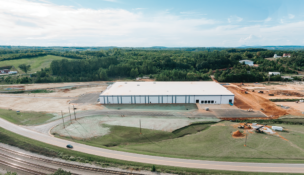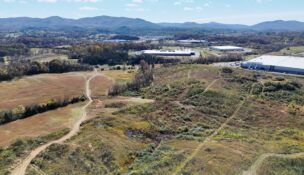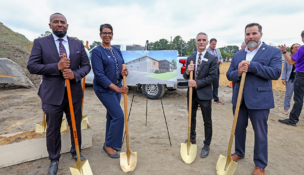All in good time
Regional economic development plans are long-term strategies
Elizabeth Lake //October 31, 2024//

Gov. Glenn Youngkin announced his Accelerate Southwest Initiative in May as keynote speaker at the annual Southwest Virginia Economic Forum held by the University of Virginia’s College at Wise. Accelerate Southwest is focused on the region’s economic development, infrastructure, housing and the cost of living. Photo courtesy Office of Governor Glenn Youngkin

Gov. Glenn Youngkin announced his Accelerate Southwest Initiative in May as keynote speaker at the annual Southwest Virginia Economic Forum held by the University of Virginia’s College at Wise. Accelerate Southwest is focused on the region’s economic development, infrastructure, housing and the cost of living. Photo courtesy Office of Governor Glenn Youngkin
All in good time
Regional economic development plans are long-term strategies
Elizabeth Lake //October 31, 2024//
For decades, the promise of economic revitalization has tantalized Southwest Virginia. The sparsely populated region, once home to booming coal mining and tobacco industries, has had money and resources thrown at it by local, state and federal governments, but it’s still had a difficult time finding its footing.
As the region’s economy has declined, so too has its population, with the University of Virginia’s Weldon Cooper Center for Public Service predicting Southwest Virginia’s headcount will have dropped by more than 10% between 2020 and 2030 and will decline more than 23% by 2050. What’s more, just over half of Southwest Virginians participate in the labor force — about 12% lower than the state average, according to the Virginia Employment Commission. That’s due to a variety of factors, including child care, transportation, housing and the opioids epidemic.
And that’s in normal times — not taking into account the impact from disasters such as Hurricane Helene, which damaged or destroyed more than 500 homes and 80 businesses across the region in September and shut down a l.5-mile segment of U.S. Route 58, a key regional artery for commerce and travel that stretches from far Southwest Virginia to Hampton Roads. The Virginia Cooperative Extension has estimated that agricultural damage in the region could surpass $125 million.
Despite Southwest Virginia’s challenges, billions of public dollars have been invested regionally during the past several years, including $3.8 billion in planned Interstate 81 improvements, $8.2 million in affordable housing support, and $1.48 billion in federal funds to expand broadband access. And that’s not to mention Highlands Community Services’ new mental health crisis center, which opened in Abingdon in May, or Emory & Henry University’s new state lab school, SWVA HEALS (Southwest Virginia Healthcare Excellence Academy Lab School), which launched in August and prepares regional high school students for careers in health care.
Plus, considering the region’s historic connection to the energy industry and its ample supply of vacant land, economic development officials have been marketing Southwest’s abandoned coal mining lands for renewable energy and data center projects. While industries like those could provide investments in jobs and capital the region needs, the situation won’t change overnight, experts caution.
“We hear all the time, ‘Oh, you guys have all this land. You can do solar everywhere. You can do projects everywhere,’” says Will Payne, director of InvestSWVA and managing partner of regional economic development consulting firm Coalfield Strategies. “And … if that was true, where are the projects right now?”
Payne is heavily plugged into Southwest Virginia politics and his work is focused on marketing the region for economic development projects.
Fighting against time
Completely revitalizing a region’s economy takes time. Energy projects are complex and can take years to get off the ground, considering the due diligence involved.
“There are no quick wins in energy generation projects,” Payne says. “There are no quick wins in data center projects.”
Even developing a solar farm can take four years to complete, and that’s “probably really aggressive,” says Will Clear, managing partner of Bristol-based consultancy Virginia Energy Strategies and a former chief deputy director of the Virginia Department of Energy.
Clear and Payne are advisers for Energy DELTA Lab, a regional nonprofit collaborative initiative to market more than 65,000 acres of previously mined land in the region to develop into renewable energy projects, such as solar, wind or hydrogen, and data centers. Partners in the initiative include energy companies, InvestSWVA, the Southwest Virginia Energy Research and Development Authority, and the Virginia Department of Energy.
“The idea of using mine lands — it makes a lot of sense … using brownfield sites, but the real issue is not that simple,” Clear says. “There’s a lot of complexities associated with land that has been previously mined and currently mined [and] potentially under permit. There’s a lot of things you have to tackle.”
In November 2023, Gov. Glenn Youngkin announced an agreement between Wise County, the Energy DELTA Lab and Dallas-based Fortune 100 energy company Energy Transfer to aid in developing a variety of energy projects that would attract private investment and fit Youngkin’s all-of-the-above strategy for fulfilling the Virginia Clean Economy Act’s renewable power mandates.
Youngkin also announced a new initiative this year, Accelerate Southwest. Aimed at improving the region’s economic development, infrastructure, housing and cost of living, the initiative focuses on existing programs like improvements to I-81 and the DELTA Lab.
On the economic development front, although it requires a great deal of time and investment to bring data centers and renewable energy projects to fruition, next year could be a turning point for such developments in the region, Clear and Payne say.
“I think that in 2025, it’d be fair to say that we’re going to see real movement here based on a lot of due diligence that’s been going on for the last three years,” Payne says.

From mining to manufacturing
Energy and data center projects are eyed as key remedies for the economically ailing region, which has seen its coal production fall off dramatically during the past three decades. The region’s coal production, which occurs mostly in Buchanan, Dickenson and Wise counties, fell from 46.6 million tons in 1990 to fewer than 10 million tons in 2020, according to the Virginia Department of Energy.
“Coal’s not dying. We’re producing more coal than we’ve ever produced. It’s just with fewer people,” Sen. Travis Hackworth, R-Tazewell County, said during the Southwest Virginia Economic Forum at the University of Virginia’s College at Wise in May.
“If you look back at that 20-year period, there were definitely highs and lows for that industry, [but] it’s continued to be a significant part of the economy,” says Randall Rose, associate vice chancellor for community and economic development at U.Va. Wise. “However, there also has been a very strategic effort looking at diversifying the region so that if there is a decline in the coal industry, it doesn’t make such a major impact on the economy and the lives of individuals.”
At U.Va. Wise, Rose is responsible for fostering the symbiotic relationship between the university’s pool of student talent and the region’s employers, as well as assisting in larger economic development and entrepreneurship-focused goals for the region.
U.Va. Wise is also part of Opportunity Southwest, a regional collaborative initiative for promoting entrepreneurship. It was formed in 2012 to create the Blueprint for Entrepreneurial Growth & Economic Prosperity in Southwest Virginia, a strategic planning document for developing a regional entrepreneurial ecosystem.
“That blueprint really set the stage for not only local economic developers and small business developers, but also regional and statewide and even federal partners to see what that future could look like and where the areas of focus would be for the Southwest region,” Rose explains.
Additionally, U.Va. Wise has been working with localities and economic development officials to research the feasibility of renewable energy and data center projects at specific sites in the region.
“We want to support in any way possible the economic developers in the region [and] the private sector,” Rose says.
Another focus of economic development efforts in Southwest Virginia has been manufacturing.
“A lot of that goes back to the blue-collar heritage of the region with the coal mining history. That workforce adapts very well to manufacturing positions, so we focus very heavily on that,” says Jonathan S. Belcher, executive director and general counsel for the Virginia Coalfield Economic Development Authority (VCEDA). Established by the General Assembly in 1988 to enhance and diversify Southwest Virginia’s economy, VCEDA works closely with the Virginia Economic Development Partnership and local economic development officials to secure new projects for the region.
Most of the manufacturing companies VCEDA seeks to recruit are advanced manufacturers using specialized equipment that requires specific training and experience. “They’re not just basic assembly positions or something that would be a lower skill level or lower-paying position,” Belcher says.
One such project was announced in November 2023, when data center storage rack manufacturer Tate announced it would establish a new 270,000-square-foot manufacturing facility in St. Paul, along the Russell and Wise counties border. The nearly $15 million project is expected to create 170 full-time jobs over the next four years, Belcher says.
The region’s manufacturing industry has started paying off — literally. Since early 2022, average annual wages in Southwest Virginia have been growing at a higher rate than the rest of the commonwealth, according to data from Chmura Economics & Analytics.
Growing tourism, small business
While Southwest Virginia continues to struggle with challenges such as its low workforce participation rate and obstacles to economic development, the region still attracts tourists to its large swaths of unspoiled, natural beauty. For that reason, tourism has continued to grow in Southwest Virginia during the past couple of decades, Belcher says. Much of the tourism in the region is centered on outdoor recreation such as hiking, ATVs and horseback riding — but it’s also home to The Crooked Road Heritage Music Trail. The scenic, 330-mile driving route connects a variety of music venues and festivals including the Birthplace of Country Music Museum in Bristol and the Floyd Country Store, which features live Appalachian music and a weekly Friday Night Jamboree.
“There’s also a lot of historical attractions in the area going back to the Colonial time period,” Belcher says. And much of Southwest’s tourism development has been “building upon those assets … building small businesses that support that.” As a result, more colleges in the area have also started to implement hospitality management and outdoor recreation management programs.
Some of these small businesses and economic stimulation comes from Airbnbs, campgrounds, restaurants and food trucks, he says. Many restaurants, coffee shops and other small retailers have emerged from seed capital programming and regional Small Business Development Centers. One such small business that’s found success is a drone photography business run by Dickenson County native Brad Deel. He received a $10,000 grant from VCEDA, and now his photography is used to market the region and promote tourism.
“We really feel like small business development is a key part of the economic development strategy as well,” Belcher says. “Relying just on larger industrial recruitment projects is a really misplaced strategy to rely solely on. The activity [we’re seeing is] really helping with the stability of the economy.”
Southwest Virginia at a glance
Known for its rural, mountainous landscapes and as the birthplace of American country and bluegrass music, Southwest Virginia includes Bland, Buchanan, Carroll, Dickenson, Grayson, Lee, Russell, Scott, Smyth, Tazewell, Washington and Wythe counties, as well as the cities of Bristol, Galax and Norton. Formerly known mostly for coal mining, the region is turning its efforts toward attracting ecotourism, alternative energy projects and data centers. The University of Virginia’s College at Wise, Emory & Henry University and Mountain Empire, Wytheville and Southwest Virginia community colleges are also located in the region.
Population
335,847
Top employers
- Walmart
- CGI
- Lee, Russell, Scott, Tazewell and Wise county school systems
- Tempur-Sealy
- Coronado Coal
Notable hotels
The Bristol Hotel (Bristol)
65 rooms, 3,800 square feet of event space
The Inn at Wise (Wise)
49 rooms, 5,000 square feet of event space
The Martha Washington Inn
& Spa (Abingdon)
63 rooms, 3,200 square feet of event space
The Primland Resort (Meadows of Dan)
53 rooms, 12,149 square feet of event space
The Sessions Hotel (Bristol)
70 rooms, 2,311 square feet of event space
Western Front Hotel (St. Paul)
30 rooms, 2,000 square feet of indoor and outdoor event space
Dining
Burger Bar (Bristol)
American, theoriginalburgerbar.com
The Tavern (Abingdon)
American, abingdontavern.net
Graze on Main (Wytheville)
Southern, bollingwilsonhotel.com/index.php/graze-on-main
Major attractions
One of the premier attractions of Southwest Virginia is the Appalachian Trail, which runs through 14 states and through the heart of the region. SWVA is also home to the 300-mile gospel, blues and bluegrass music heritage trail The Crooked Road and Bristol’s Birthplace of Country Music Museum. In Damascus, up to 20,000 people attend the Appalachian Trail Days Festival each year. On Nov. 14, the Hard Rock Hotel & Casino Bristol is set to host a grand opening of its $515 million permanent facility, including the Hard Rock Live entertainment venue. For live stage performances, visit The Barter Theatre in Abingdon, the nation’s longest-running Actors’ Equity theater.
n

















